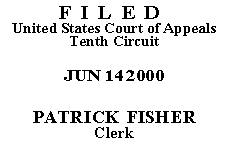

| UNITED STATES OF AMERICA,
Plaintiff-Counter- Defendant-Appellee, v. 129.97 ACRES OF LAND, MORE OR LESS, SITUATED IN DAVIS COUNTY, STATE OF UTAH; EDWIN M. HIGLEY; CARL BOWN; B.C. PROPERTIES; MTGLQ INVESTORS, Defendants-Appellees, LYNN A. JENKINS, Defendant-Counter- Claimant-Appellant. |
|
Plaintiff Lynn A. Jenkins appeals from several orders relating to the United States' condemnation of certain land in Davis County, Utah. We had abated the appeal on jurisdictional grounds because there was an outstanding Fed. R. Civ. P. 59(e) motion, which Jenkins filed after he filed his notice of appeal. The district court subsequently denied that motion, and we now have jurisdiction pursuant to 28 U.S.C. § 1291.
On August 26, 1997, the United States filed a complaint in condemnation along with a declaration of taking to acquire the Davis County property. The action sought to enforce an option agreement negotiated between the purported property owner, Edward Higley, and The Nature Conservancy under which Higley agreed to sell the property to the Nature Conservancy for $133,250.50. The agreement, which became effective on April 3, 1995, was subsequently assigned to the United States though the Bureau of Reclamation, which exercised the option on March 25, 1996. Higley was unable or unwilling to provide clear title by August 5, 1996, and the United States therefore brought this action.
Jenkins asserted a claim of ownership in the property, and was later added as a defendant. He filed an answer and asserted a counterclaim alleging, inter alia, that the option agreement was obtained through fraudulent means. He also sought an independent prosecutor to investigate the alleged fraud involving the option agreement. The district court denied his motion to transfer the case to the United States Court of Federal Claims and his request for an independent prosecutor, and granted the government's motion to dismiss his counterclaim. The court subsequently granted the government's motions for summary judgment against Jenkins and to enforce the option agreement, concluding that as of the date of taking (August 26, 1977), Jenkins had no ownership interest in the property and, therefore, no standing to remain in the case, and that there was no evidence to support any fraud allegations involving the option agreement.
We review the district court's grant of summary judgment and its dismissal of Jenkins' counterclaim de novo. See Simms v. Oklahoma ex rel. Dep't of Mental Health & Substance Abuse Servs., 165 F.3d 1321, 1326 (10th Cir.), cert. denied, 120 S. Ct. 53 (1999); Sutton v. Utah State Sch. for the Deaf & Blind, 173 F.3d 1226, 1236 (10th Cir. 1999). On appeal, Jenkins raises a variety of arguments focusing primarily on the district court's determination that he did not have an ownership interest in the property prior to the government's declaration of taking, on his claim that the option was fraudulently obtained, and on alleged procedural irregularities by the government. We have fully considered all of the arguments Jenkins raises on appeal and reviewed the record, and we find his arguments unpersuasive. For substantially the same reasons as stated by the district court in its May 3, 1999 order granting summary judgment against Jenkins and its March 31, 1998 order dismissing his counterclaim and denying his motion to transfer and to appoint an independent prosecutor, we AFFIRM the district court's judgment. The mandate shall issue forthwith.
.
Entered for the Court
Circuit Judge
*. This order and judgment is not binding precedent, except under the doctrines of law of the case, res judicata, and collateral estoppel. The court generally disfavors the citation of orders and judgments; nevertheless, an order and judgment may be cited under the terms and conditions of 10th Cir. R. 36.3.